The Ultimate Long-Distance Instruments from INFINITY....
The K-Series Family of Long-Distance Microscopes incorporate refinements which attain new levels of performance. In most cases, we know of no other instruments that even approximate their imagery.
We have assembled the information below in order to put each K-Series instrument in perspective. There is at least one K-Series instrument that will meet your needs, but one or more of the others may warrant consideration as well.
IT ALL BEGAN with the original Model K2 in 1984. The K2 quickly became the world standard in long-distance microscopes—and, as the present K2 DistaMax—still is. Over time, customers asked us for some other variations to meet specific needs, culminating in the K1 CentriMax (see below) incorporating Infinity's exclusive CentriTel® system.
Presently, four instruments comprise the K-Series:
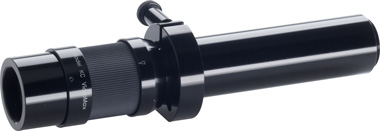
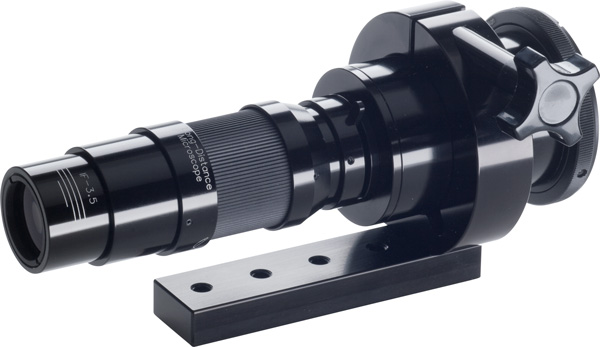 PRIMARILY for C-mount Cameras - Versatile and Cost-effective. With resolution and aperture greater than stereomicroscopes, the KC VideoMax shares many—if not all—potential rear accessories in common with our flagship Model K2 DistaMax, including step-up from basic C-mount to T-mount (e.g., Nikon F, Canon EOS, etc.), dual-port capability—even zoom. In many ways, the KC VideoMax is nothing short of a K2 DistaMax scaled down in size and long-distance aperture capabilities. Yet its diameter (S Version) is only slightly larger than a felt-tip marker pen. The KC VideoMax encompasses the capabilities of the entire InfiniTube line (see our Proximity Series) for close-focus assignments with IF-Series and other infinity-corrected microscope objectives, filter holders and coaxial illuminators—to the the theoretical limits of optical microscopy. Unlike the K2 DistaMax, the KC VideoMax can be used directly (without frontal objectives) as a long-distance microscope where, compared to the K2 DistaMax, its light grasp is one-quarter (due to the inverse square law) and its resolution is about half (due to its 20mm of aperture compared to the K2 DistaMax's 38mm)—at any equal distance and magnification. Move-in closer and it becomes a real performer. The KC VideoMax—as its name implies—is a single instrument that can be equipped to maximize imaging requirements as they arise, now and in the future.
PRIMARILY for C-mount Cameras - Versatile and Cost-effective. With resolution and aperture greater than stereomicroscopes, the KC VideoMax shares many—if not all—potential rear accessories in common with our flagship Model K2 DistaMax, including step-up from basic C-mount to T-mount (e.g., Nikon F, Canon EOS, etc.), dual-port capability—even zoom. In many ways, the KC VideoMax is nothing short of a K2 DistaMax scaled down in size and long-distance aperture capabilities. Yet its diameter (S Version) is only slightly larger than a felt-tip marker pen. The KC VideoMax encompasses the capabilities of the entire InfiniTube line (see our Proximity Series) for close-focus assignments with IF-Series and other infinity-corrected microscope objectives, filter holders and coaxial illuminators—to the the theoretical limits of optical microscopy. Unlike the K2 DistaMax, the KC VideoMax can be used directly (without frontal objectives) as a long-distance microscope where, compared to the K2 DistaMax, its light grasp is one-quarter (due to the inverse square law) and its resolution is about half (due to its 20mm of aperture compared to the K2 DistaMax's 38mm)—at any equal distance and magnification. Move-in closer and it becomes a real performer. The KC VideoMax—as its name implies—is a single instrument that can be equipped to maximize imaging requirements as they arise, now and in the future.
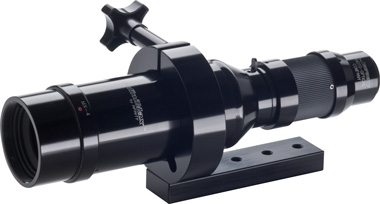 PRIMARILY for C-mount to 2/3-in. Format Cameras - Long-Distance/High-Speed Emphasis - The KX InfiniMax is ideal for high-speed applications with C-mount cameras but is by no means limited to such uses. The KX InfiniMax may be thought of as something of a "hybrid" in that it combines features of the KC VideoMax with the K1 CentriMax (see below). It has a higher aperture at any equal distance than the KC VideoMax by sharing the same MX-Series objectives with the K1 CentriMax (see below).
PRIMARILY for C-mount to 2/3-in. Format Cameras - Long-Distance/High-Speed Emphasis - The KX InfiniMax is ideal for high-speed applications with C-mount cameras but is by no means limited to such uses. The KX InfiniMax may be thought of as something of a "hybrid" in that it combines features of the KC VideoMax with the K1 CentriMax (see below). It has a higher aperture at any equal distance than the KC VideoMax by sharing the same MX-Series objectives with the K1 CentriMax (see below).
The KX InfiniMax maintains its magnification with movement towards and away from the object with most MX-Series objectives. Refocusing after movement re-establishes the original magnification. This ConstantMag™ system makes the KX InfiniMax ideal for Z-stacking techniques provided some form of mechanical positioner is employed with it—as well as making exact positioning irrelevant in difficult set ups. A virtually fool-proof high-resolution optic for use specifically with C-mount cameras, the KX InfiniMax meets the most demanding needs.
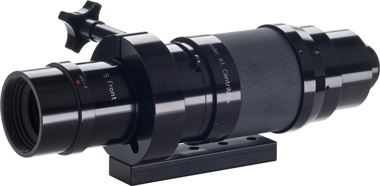 PRIMARILY for C/T-mount to 4/3-in. Format Cameras and Beyond - MX-LR Objective ALONE Focuses from 3 Meters to 530mm - BEST BUY for All-Around Use - Includes CentriTel®. Now given the K1 designation, the original CentriMax has been upgraded to be more robust and to directly cover up to 4/3-in. formats. Since it shares the MX-Series objectives with the KX InfiniMax, it has resolution and aperture second only to our own Model K2 DistaMax. Like the KX InfiniMax, the K1 CentriMax is a "light bucket" for high magnification/high-speed long-distance applications but can also be used directly with larger than C-mount formats.
PRIMARILY for C/T-mount to 4/3-in. Format Cameras and Beyond - MX-LR Objective ALONE Focuses from 3 Meters to 530mm - BEST BUY for All-Around Use - Includes CentriTel®. Now given the K1 designation, the original CentriMax has been upgraded to be more robust and to directly cover up to 4/3-in. formats. Since it shares the MX-Series objectives with the KX InfiniMax, it has resolution and aperture second only to our own Model K2 DistaMax. Like the KX InfiniMax, the K1 CentriMax is a "light bucket" for high magnification/high-speed long-distance applications but can also be used directly with larger than C-mount formats.
A new MX-LR Objective allows focus from 3 meters down to 530mm—directly and without any other objective changes. Then, MX-Series and other infinity-corrected microscope objectives, filter holders and coaxial illumination can supplement the K1 CentriMax so that it can be used to the theoretical limits of optical microscopy!
As if all the above were not enough, the K1 CentriMax incorporates Infinity's proprietary* CentriTel system. Once focus is set at a specific point, the CentriTel system allows focal translation from a fixed position without essential magnification changes. This means that the K1 CentriMax can literally be "bolted" to a fixture and its internal focusing CentriTel system allows up and down focus with virtually no magnification differences. Built-in CentriTel makes the K1 CentriMax the near-perfect choice for Z-stacking. No other long-distance microscope in the world is its equal and only our own K2 DistaMax is its better for some research applications. Taking all its capabilities into account, the easy-to-use K1 CentiMax is Infinity's "best buy" long-distance microscope.
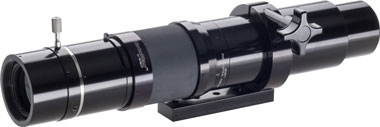 ALL FORMATS - HIGH SPEED - RESEARCH and BREADBOARD APPLICATIONS. Simply put, the Model K2 DistaMax is the world's finest long-distance microscope. The only question is not what is can do, but what it can not. It has the highest resolution of any K-Series instrument or, for that matter, any other long-distance
microscope. The K2 DistaMax has unsurpassed adaptability so that dual-port Mirror Diverters, Zoom modules, Amplifiers or Tele-compressors may be added or interfaced. In short, it can do everything every other K-Series instrument can do and do it to research standards. It can even be used for CentriTel applications with a supplemental unit. For long-distance microscopy, the Model K2 DistaMax is the ultimate choice.
ALL FORMATS - HIGH SPEED - RESEARCH and BREADBOARD APPLICATIONS. Simply put, the Model K2 DistaMax is the world's finest long-distance microscope. The only question is not what is can do, but what it can not. It has the highest resolution of any K-Series instrument or, for that matter, any other long-distance
microscope. The K2 DistaMax has unsurpassed adaptability so that dual-port Mirror Diverters, Zoom modules, Amplifiers or Tele-compressors may be added or interfaced. In short, it can do everything every other K-Series instrument can do and do it to research standards. It can even be used for CentriTel applications with a supplemental unit. For long-distance microscopy, the Model K2 DistaMax is the ultimate choice.
It's easy to select the proper K-Series instrument. Consider the SEVEN POINTS:
- Camera/Sensor Size
- Sensor Sensitivity (e.g., if HIGH-SPEED/low light application is envisaged)
- Magnification
- Field of View
- Resolution
- Working Distance
- The Inverse Square Factor (e.g., the KC VideoMax has only 25% the light grasp of the K2 DistaMax at the same working distance and magnification).
Feel free to visit each instrument's site page where even more information is in each model's PDFs. If you need additional help or information, please contact us.
* U.S. Patents 4,988,173 and 7,869,139.